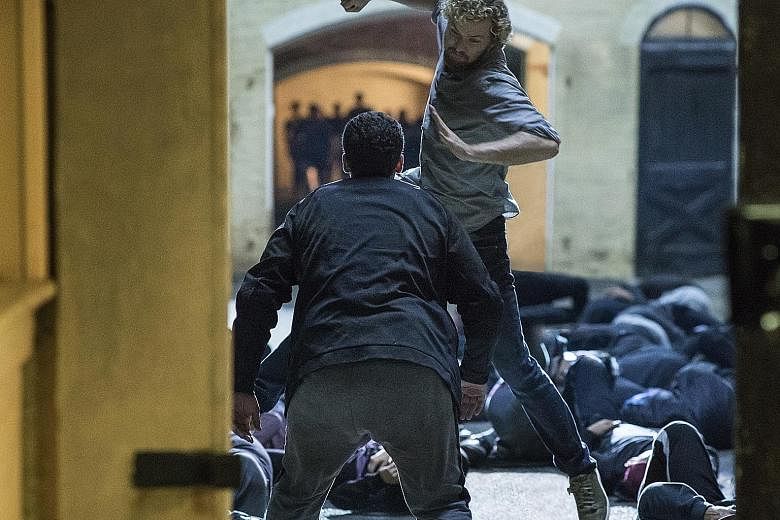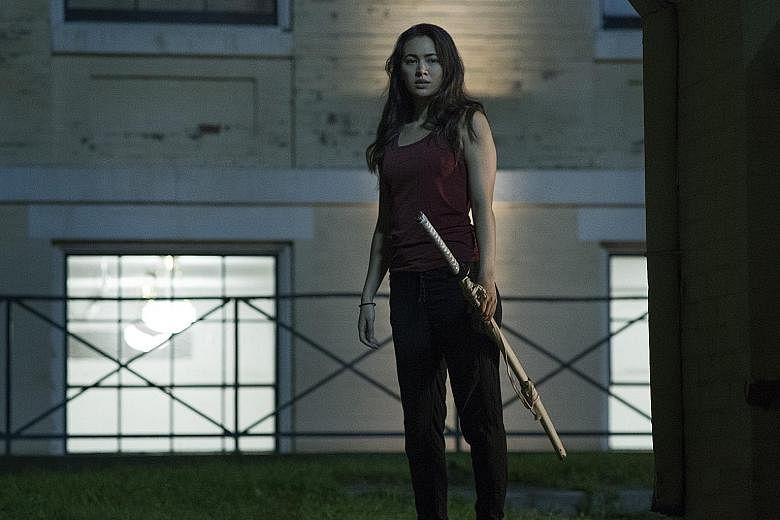Finn Jones and Jessica Henwick, stars of the new superhero series, Marvel's Iron Fist, have become reluctantly embroiled in a contentious debate over whether its storyline amounts to cultural appropriation.
In a recent interview with The Straits Times in New York, the pair passionately defend the new show, which debuts on Netflix on Friday.
Featuring Jones as martial arts superhero Danny Rand and Henwick as his ally, Colleen Wing, it has sparked numerous online reports and comments about whether this gongfu-kicking white superhero is misappropriating elements of Asian culture.
The two actors - who both had supporting roles on hit fantasy series Game Of Thrones - argue that such criticisms are misplaced.
British actress Henwick says that as an advocate for better Asian representation on screen, she would never "accept a role based on stereotypes because I don't want to take us two steps backwards".
The 24-year-old, who also appeared in 2015's fantasy blockbuster Star Wars: The Force Awakens, has a Chinese Singaporean mother and English father. "I'm Asian and I'm an actor. If anyone understands the conversation that is happening, it's me," she says vehemently.
Jones, a 28-year-old Briton, is frustrated that netizens criticised Iron Fist before even watching the show, arguing that once people see it, they will realise Rand is not being portrayed as a "white saviour".
But similar criticisms have been levelled at the series by reviewers who have watched several episodes.
For detractors, the main issue is the fact that Rand is white. The character becomes a Buddhist monk and gongfu whiz after stumbling upon the city of K'un-lun, which, in the comic books, is in the Himalayas. There, he learns how to summon a mystical force known as the Iron Fist before returning to the United States and becoming a superhero.
Critics argue that this is an example of cultural appropriation - a controversial concept that refers to when a dominant group - in this case, whites - absorbs and exoticises aspects of a minority culture.
Aspects of the minority culture deemed "cool" may also be cherry- picked and used out of context in a way that members of that culture find disrespectful or that ignores the prejudice they have faced.
But there are others who decry this idea, which has been used to castigate white artists who borrow from minority cultures in music and fashion too. They say it hinders the freedom of expression and that artists should be able to use elements of other cultures as they please.
The cultural appropriation debate is not to be confused with the furore over "whitewashing", in which white actors are cast as characters originally conceived as Asian.
This is because in the comics, Rand was always white, although some fans argue that an Asian actor should have been cast instead of Jones. As award-winning Taiwanese American comic writer Marjorie Liu tweeted last year: "Iron Fist is an orientalist-white-man-yellow- fever narrative. Asian actor would have helped subvert that offensive trope, and reclaim space."
Iron Fist's stars say they are fully sympathetic to such concerns.
Henwick says: "I've been acting for nine years and I've experienced in my personal and professional life what it means to be Asian and what it means to be a woman."
She admits that she had been nervous about playing Asian characters after becoming the first East Asian actress to headline a British television series, the children's show, Spirit Warriors.
"Everyone made it a big deal that I was the first, and so, I felt this enormous pressure and shied away from it. I wouldn't touch roles with 'Asian' in it. Like in Game Of Thrones, I played a character of a fake ethnicity, 'Dornish', and in Star Wars, I played an American."
But now, she says: "I've reached the stage where I wanted to tell a different story and I wanted to actively pursue an Asian role.
"That's why I chose Iron Fist, but I was nervous because of my history and because I'm so outspoken about Asian misrepresentation and un-representation in the media and I have so much goodwill from Asians."
To her Asian fans, Henwick has a personal message: "What I would say, for those Asians who have followed me, is to trust in the work that I've put in and trust in my career. To date, I have turned down more roles than I have accepted roles based on stereotypes."
Jones acknowledges that many people are worked up over this because "we live in a world which is very unequal culturally, economically and politically and people feel like they're being screwed over" and that there needs to be more roles for people of colour in television and film.
But he adds: "It kind of annoys me that we live in a world now where, because of the Internet, people just see a headline and they go 'whoa!'."
Earlier this month, the actor briefly suspended his Twitter account after getting embroiled in a spat over the issue.
It was triggered by his retweeting of a speech by Rogue One: A Star Wars Story (2016) star Riz Ahmed about Asian representation on screen, which Twitter user Asyiqin Haron - the Singaporean creative director of fan site Geeks Of Color - felt was ironic given the controversy over Iron Fist.
In New York, Jones attempts to rebut some of the specific complaints about the show.
"What I'm hearing is 'Danny Rand is the white-saviour narrative'. But our version couldn't be further from that. Danny can hardly save himself, let alone an entire race of people," he says of the character, who was left for dead after a plane crash 15 years ago and is now trying to reclaim his family's billion-dollar business.
He points out: "The second thing is that in the comics, K'un-lun is mainly an Asian culture, but in our version, it's also populated by people from many cultures and not just Asia. It also has people from South America and Europe.
"So, as the show goes on, you'll understand that this world is broader and a lot more nuanced than maybe the comic books first intended."


